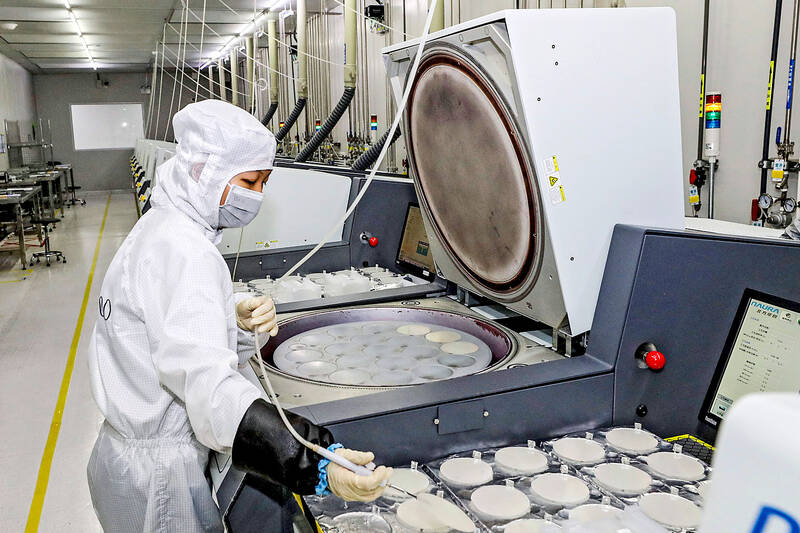China has claimed a breakthrough in developing homegrown chipmaking equipment, an important step in overcoming US sanctions designed to thwart Beijing’s semiconductor goals.
State-linked organizations are advised to use a new laser-based immersion lithography machine with a resolution of 65 nanometers or better, the Chinese Ministry of Industry and Information Technology (MIIT) said in an announcement this month.
Although the note does not specify the supplier, the spec marks a significant step up from the previous most advanced indigenous equipment — developed by Shanghai Micro Electronics Equipment Group Co (SMEE, 上海微電子) — which stood at about 90 nanometers.

Photo: AFP
MIIT’s claimed advances last week suggest that homegrown Chinese companies are beginning to make headway in developing more sophisticated machines, although SMEE and its peers have a long way to go to catch the likes of ASML Holding NV.
The resolution of the gear determines the scale at which integrated circuits can be imprinted onto silicon, and ASML’s best lithography machines now have a resolution of about 8 nanometers.
One approach to improve the density of transistors is etching lower-resolution patterns multiple times, as used by Huawei Technologies Co (華為), which helps narrow the gap.
Still, the US-led trade campaign to limit China’s access to advanced chipmaking equipment has stifled its competitiveness in developing nascent technologies such as artificial intelligence, which require the most advanced semiconductors.
In its note, the MIIT also named a slew of additional home-developed chip-related gear it wanted to see put into wider use, including oxidation furnaces and dry-etching gear.
SMEE has developed a lithography machine that can be used to make 28-nanometer chips, key state backer Zhangjiang Group (張江集團) declared last year.
However, it is unclear whether that machine has gone into production and how it relates to last week’s notice from the MIIT.
While it is widely believed that China would struggle to move far beyond its current level of sophistication — as exemplified by Huawei’s 7-nanometer Kirin mobile chip introduced a year ago — the lack of transparency has elicited concern in Washington about the effectiveness of its sweeping export controls on China and pressing the Netherlands for tighter restrictions on ASML’s China business.
China relies on ASML’s immersion deep ultraviolet lithography systems to advance its chipmaking technology, as the country has not yet been able to develop similarly capable equipment, but under US pressure, ASML is now barred from shipping to China.

TAKING STOCK: A Taiwanese cookware firm in Vietnam urged customers to assess inventory or place orders early so shipments can reach the US while tariffs are paused Taiwanese businesses in Vietnam are exploring alternatives after the White House imposed a 46 percent import duty on Vietnamese goods, following US President Donald Trump’s announcement of “reciprocal” tariffs on the US’ trading partners. Lo Shih-liang (羅世良), chairman of Brico Industry Co (裕茂工業), a Taiwanese company that manufactures cast iron cookware and stove components in Vietnam, said that more than 40 percent of his business was tied to the US market, describing the constant US policy shifts as an emotional roller coaster. “I work during the day and stay up all night watching the news. I’ve been following US news until 3am

UNCERTAINTY: Innolux activated a stringent supply chain management mechanism, as it did during the COVID-19 pandemic, to ensure optimal inventory levels for customers Flat-panel display makers AUO Corp (友達) and Innolux Corp (群創) yesterday said that about 12 to 20 percent of their display business is at risk of potential US tariffs and that they would relocate production or shipment destinations to mitigate the levies’ effects. US tariffs would have a direct impact of US$200 million on AUO’s revenue, company chairman Paul Peng (彭雙浪) told reporters on the sidelines of the Touch Taiwan trade show in Taipei yesterday. That would make up about 12 percent of the company’s overall revenue. To cope with the tariff uncertainty, AUO plans to allocate its production to manufacturing facilities in

COLLABORATION: Given Taiwan’s key position in global supply chains, the US firm is discussing strategies with local partners and clients to deal with global uncertainties Advanced Micro Devices Inc (AMD) yesterday said it is meeting with local ecosystem partners, including Taiwan Semiconductor Manufacturing Co (TSMC, 台積電), to discuss strategies, including long-term manufacturing, to navigate uncertainties such as US tariffs, as Taiwan occupies an important position in global supply chains. AMD chief executive officer Lisa Su (蘇姿丰) told reporters that Taiwan is an important part of the chip designer’s ecosystem and she is discussing with partners and customers in Taiwan to forge strong collaborations on different areas during this critical period. AMD has just become the first artificial-intelligence (AI) server chip customer of TSMC to utilize its advanced

Six years ago, LVMH’s billionaire CEO Bernard Arnault and US President Donald Trump cut the blue ribbon on a factory in rural Texas that would make designer handbags for Louis Vuitton, one of the world’s best-known luxury brands. However, since the high-profile opening, the factory has faced a host of problems limiting production, 11 former Louis Vuitton employees said. The site has consistently ranked among the worst-performing for Louis Vuitton globally, “significantly” underperforming other facilities, said three former Louis Vuitton workers and a senior industry source, who cited internal rankings shared with staff. The plant’s problems — which have not